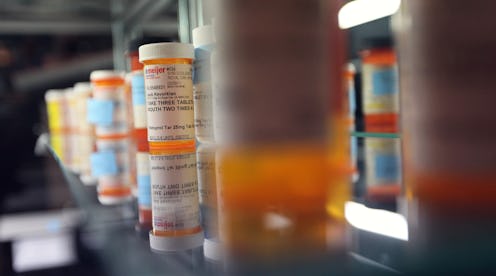News
What You Should Know About This Controversial Drug Bill Trump Is About To Sign Into Law

Critics and opponents are deeply divided over recently passed legislation that will make experimental treatments much more readily available to willing patients. President Trump is expected to sign the controversial legislation — known as the "Right to Try" bill — on Wednesday, which would grant patients access to drugs not yet approved by the Food and Drug Administration (FDA).
The impact of the bill is straightforward — those with terminal illnesses will have a fast-track option for treatments that have yet to clear all FDA guidelines. According to NPR, patients seeking experimental treatments will still require a doctor's approval, as well as compliance from the relevant drug companies. The legislation does not compel drug makers to provide their goods upon request.
That's one reason some oppose the measure. Democratic Rep. Frank Pallone Jr. argued during House debate over right to try that "by removing FDA oversight, you are counting on physicians and manufacturers to serve as the gatekeeper and protector of patients." Pallone Jr. said he doesn't "buy that that’s going to work.”
But right to try supporters argue that patients are the best judges of their own well-being. Frank Mangiello, a right-to-try advocate who suffers from ALS, told CNN, "It's very important to me to be able to look my wife and children in the eye and say we did everything possible and say we never gave up."
President Trump tweeted in support of the measure Wednesday, name-checking "RIGHT TO TRY" and commenting that "Big legislation will be signed by me shortly."
As reported at The Hill, noted Republican donors the Koch brothers have spent heavily in support of the measure. Americans for Prosperity — an advocacy group funded by Charles and David Koch — spent over six figures to push for the passage of "Right to Try." Americans for Prosperity also said they would make the bill a key vote issue, assigning each congressional member a score according to how they voted.
But over 100 advocacy groups voiced their opposition to right to try in a letter sent Monday to House leaders. The signatories — including the American Cancer Society Cancer Action Network — expressed multifold concerns with the Right to Try bill. Their letter argued that the new legislation would "not increase access to promising therapies for our patients because it does not address the primary barriers to access." They also highlighted the FDA's approval of 99 percent of patient requests for experimental medications, noting that it is much more regularly drug companies themselves that deny access, not the FDA.
While House members voted mostly along partisan lines, 22 Democrats joined the majority Republican support for the Right to Try bill, in a vote of 250-169. The Senate's version of the bill passed with unanimous consent back in August.
Rightotry.org states that the FDA can take up to 15 years to approve new drug regimens for terminal illness, a length of time most seriously ill patients do not have. The newly passed legislation theoretically removes that hurdle.
However, as Michelle Cortez points out at Bloomberg, there are risks to allowing patients free rein with untested medications. She notes that "patients who are terminally ill may suffer complications or die after taking experimental medicines, potentially jeopardizing clinical studies for drugs that could benefit others." It's reasonable to assume that if an unregulated medication causes one patient more harm than good, potential participants for a clinical trial may back out — or never sign up in the first place.
There's also the issue of drug companies turning down requests for experimental treatments. Some only make enough of their product to conduct clinical trials, and have no extra medication available for "compassionate use" requests. Others may be skittish about unjustified conclusions that might be drawn about their drug's effectiveness when used without regulation or proper oversight.
Still, right-to-try advocates will no doubt be celebrating Wednesday as the president signs into law a patient's access to experimental medication for terminal illnesses.